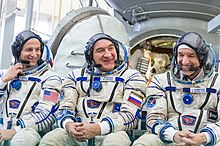Soyuz MS-13
Roskosmos | |
| COSPAR ID | 2019-041A |
|---|---|
| SATCAT no. | 44437 |
| Mission duration | 200d 16h 44m |
| Orbits completed | 3,216 [1] |
| Spacecraft properties | |
| Spacecraft | Soyuz-MS |
| Spacecraft type | RKK Energia |
| Crew | |
| Crew size | 3 |
| Members | Aleksandr Skvortsov Luca Parmitano |
| Launching | Andrew R. Morgan |
| Landing | Christina Koch |
| Callsign | Cliff |
| Start of mission | |
| Launch date | 20 July 2019, 16:28:21 UTC[2] |
| Rocket | Soyuz-FG |
| Launch site | Baikonur, Site 1/5 |
| End of mission | |
| Landing date | 6 February 2020, 09:12:45 |
| Landing site | Steppes of Kazakhstan. |
| Orbital parameters | |
| Reference system | Geocentric |
| Regime | Low Earth |
| Inclination | 51.6° |
| Docking with UTC[1] | |
| Time docked | 164d 1h 51m |
 (l-r) Morgan, Skvortsov and Parmitano Soyuz programme (Crewed missions) | |
Soyuz MS-13, also designated ISS flight 59S, was a crewed Soyuz mission launched on 20 July 2019 – the 50th anniversary of the first Moon landing – [2] carrying three members of the Expedition 60 crew to the International Space Station: a Russian commander, an American and a European flight engineer. Soyuz MS-13 was the 142nd flight of a Soyuz spacecraft. It was at one point the last Soyuz flight contracted by NASA in the expectation that subsequent astronaut transport would be provided by the Commercial Crew Program,[5] but in early 2019 NASA sought to purchase two additional Soyuz seats to provide greater certainty given delays in that program.[6]
Crew
| Position | Launching Crew member | Landing Crew member |
|---|---|---|
| Commander | RSA Expedition 60/61 Third and last spaceflight | |
| Flight Engineer 1 | Expedition 60/61 Second spaceflight | |
| Flight Engineer 2 | Expedition 60/61/62 First spaceflight |
Expedition 59/60/61 First spaceflight |
Backup crew
| Position | Crew member[1] | |
|---|---|---|
| Commander | RSA
| |
| Flight Engineer 1 | ||
| Flight Engineer 2 | ||
Relocation
The Soyuz crew relocated the MS-13 spacecraft from the aft port of the Zvezda module and performed a manual docking on the Poisk module on 26 August 2019.[4] This cleared the way for Soyuz MS-14 to perform an automatic docking on Zvezda, after a faulty signal amplifier on Poisk caused MS-14's first docking attempt to abort on 24 August 2019.[8] The last time a Soyuz spacecraft was relocated was in August 2015 during the Soyuz TMA-16M mission.[9]
References
- ^ a b c d e "Spaceflight mission report Soyuz MS-13". spacefacts.de.
- ^ a b "Запуск "Союза" к МКС перенесли по просьбе НАСА" [Soyuz launch to ISS was postponed upon NASA's request] (in Russian). RIA Novosti. 12 April 2019. Retrieved 13 April 2019.
- ^ Return
- ^ a b c Relocates Russian Soyuz Spacecraft to Different Port
- ^ Harwood, William (31 August 2018). "Station crew faces busy schedule as commercial crew schedule ramps up". Spaceflight Now. Retrieved 1 September 2018.
- ^ "PROCUREMENT OF CREW TRANSPORTATION AND RESCUE SERVICES FROM ROSCOSMOS – Federal Business Opportunities: Opportunities". fbo.gov.
- ^ Pelo, Para Que Sirve Ponerse Aceite De Oliva En El (8 March 2019). "On International Women's Day, NASA Looks Forward to First All-Female EVA in Late March; Koch Tapped for Longer ISS Stay". AmericaSpace.
- ^ Clark, Stephen (24 August 2019). "Station crew to clear new port for second Soyuz docking attempt – Spaceflight Now".
- ^ Tariq, Malik (26 August 2019). "Space Station Crew Takes Soyuz Capsule for 'Sunday Drive' to Swap Parking Spots". Space.com.



